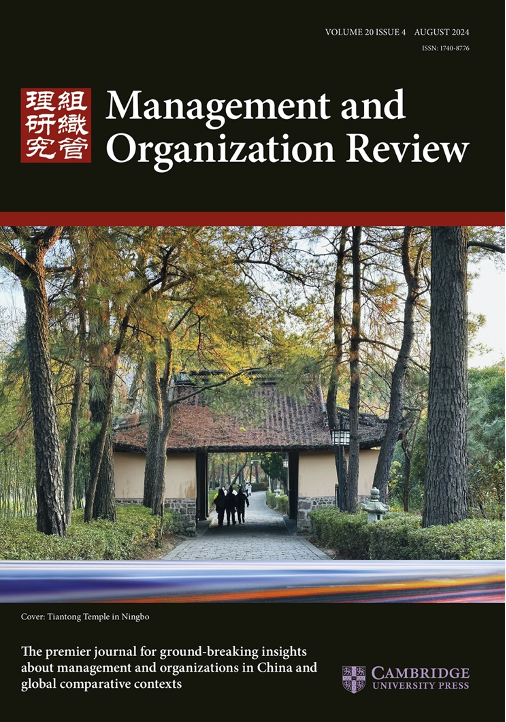Volume 20 – Issue 4 – August 2024

Dear IACMR members,
Hope you are all have a wonderful holiday season! I’m happy to share with you the newly published MOR issue!
https://www.cambridge.org/core/journals/management-and-organization-review/latest-issue#
In the last issue, we published a perspective paper by Zhang and Chen (2024) that discusses the extent to which the publishing practices in mental health research can be adopted in management research. This issue publishes commentaries from two senior scholars, Jerry Davis and Ray Friedman, in response to the paper. Davis argues that management scholarship would benefit from researching significant societal problems that may be transient, as illustrated by how medical and public health researchers responded to the COVID-19 outbreak, whereas Friedman argues that management scholars already deal with important organizational/societal problems and cautions that becoming more focused on facts rather than theory may make management research less, rather than more, relevant. I strongly encourage more scholars to participate in this debate, because such debate can help us reflect on what management research has contributed to address societal problems in the past, but more importantly, clarify our future directions.
This issue also publishes six regular articles covering a wide range of topics from micro to macro. Among the three micro papers, one studies the effects of individual positive status change on subsequent behaviors (Zhang, Qiao, Jia, Ju, & Wang, 2024). The authors theorize and demonstrate that positive status change will induce two types of pride: authentic pride and hubristic pride. Authentic (hubristic) pride is more likely evoked in a situation characterized by low (high) status differentiation and, in such a situation, individuals with positive status change are more likely to engage in prosocial (self-interested) behaviors. Another paper investigates the relationship between stretch goals and radical creativity among employees (Liu, Xu, Yu, Wu, & Wang, 2024). The authors identify cognitive flexibility as a key moderator and find empirical evidence. Specifically, for employees with high (low) cognitive flexibility, stretch goals increase (decrease) their willingness to assume risks and improve engagement in radical creative activities. The third paper focuses on the relationship between CEOs’ clan values and their companies’ engagement in corporate social responsibility (CSR) activities (Wang, Tang, & Wang, 2024). Based on the analysis of a longitudinal sample of Chinese publicly listed firms from 2010 to 2019, the authors find a positive relationship between CEOs’ clan values and their companies’ institutional CSR, but this relationship varies with CEOs’ personal attributes, such as overseas experience and hometown identity. For those who were exposed to clan culture in childhood and had a strong hometown identity, engaging in CSR activities is a means to ‘glorify their ancestors’.
Among the three macro papers, the first offers a novel structural perspective, namely, the hierarchical inconsistency among family-member top leaders, to explain nonfamily executives’ high compensation in family firms (Guo & Deng, 2024). The authors argue that this structure triggers contestations between the heads of the two hierarchies, adding complexity and challenges to nonfamily executives’ jobs, thus higher compensation is needed to make up for the demanding features of these professional managers’ work. Using public family firms’ data in China, they found support for the key hypotheses. The second paper studies the relationship between firms’ innovation performance feedback and bridging new ties (Nie & Wang, 2024). Using Chinse public listed firms in the pharmaceutical industry from 2010 to 2020, the authors found that the magnitude of a firm’s outperformance (underperformance) relative to its aspirations had a positive (inverted U-shaped) relationship with the share of new bridging ties, supporting the behavioral theory of the firm that assumes decision-makers’ bounded rationality.
The last paper, entitled ‘Industrial specialization in China: Effects of central tools governing subnational agency’, examines how the central government’s management of subnational governments’ agency influences the smartness of the latter’s industrial specialization choices (Prud’Homme & He, 2024). The authors study two prominent tools – facilitating organizational efficacy and promoting officials to higher ranks – and how they respectively explain recent industrial specialization choices by China’s 31 provincial governments. Their findings reveal that provincial governments with greater organizational efficacy, measured by access to better-resourced local state-owned enterprises in focal industries, make smarter specialization policies. Meanwhile, provincial governments with greater numbers of officials previously promoted to the central government, contrary to conventional wisdom, made potentially less smart specialization policies. These findings are intriguing; they call for more research to explain the underlying logics and mechanisms.
With gratitude,
Xiao-Ping
Editor of MOR
Letter from the Editor
Letter from the Editor
Xiao-Ping Chen
Article
Becoming Better: When and Why Positive Status Change Induces Prosocial Behavior Versus Self-Interested Behavior
Zhe Zhang, Yueqiao Qiao, Ming Jia, Boyuan Ju, Xingquan Wang
Stretch Goals and Radical Creativity: Cognitive Flexibility as a Key Contingency
Zhiqiang Liu, Yuping Xu, Ziyi Yu, Bingqing Wu, Zijing Wang
To Glorify the Ancestors: How CEOs’ Clan Values Affect Corporate Social Responsibility
Yue Wang, Yi Tang, Tao Wang
Hierarchical Inconsistency Among Family-Member Top Leaders and Nonfamily Executives’ Compensation Levels: Evidence from Chinese Family Firms
Yidi Guo, Zhangxuan Deng
Beyond Collaborative Network Communities: Innovation Performance Feedback and the Formation of New Bridging Ties
Yafei Nie, Jingbei Wang
Industrial Specialization in China: Effects of Central Tools Governing Subnational Agency
Dan Prud’homme, Wenlong He
Dialogue, Debate, and Discussion
Editor’s Introduction to a Discussion, Debate, and Dialogue (D3) Forum on the Similarities and Differences between Medical and Management Research
Johann Peter Murmann
Is ‘Contribution to Theory’ an Unhealthy Obsession for Management Research? A Response to Zhang and Chen
Gerald F. Davis
Science, Stories, and Impact: A Response to Zhang and Chen
Ray Friedman
